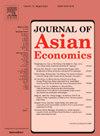Are social norms an obstacle to honest behavior? Theory and experimental evidence
IF 2.9
3区 经济学
Q1 ECONOMICS
引用次数: 0
Abstract
This study theoretically and experimentally investigates the effects of intrinsic dishonesty costs and other-regarding preferences reflecting social norms on honest behavior when people have the opportunity to act collaboratively and conduct mutual monitoring. We set up a theoretical model to clarify this effect and, then, report the results of a series of lab-in-the-field experiments conducted in two communities of Bangladesh, villages in the Chittagong Hill Tracts and the University of Chittagong. The participants played a trust game and a confidential die-roll game. Our experimental results show that mutual monitoring helped to increase honest behavior in both the traditional and university communities, but worked more effectively in the latter compared to the former. As predicted by our theoretical model, other-regarding preferences worked differently by significantly discouraging honest behavior among the community leaders but encouraging honest behavior among the students.
社会规范是诚实行为的障碍吗?理论与实验证据
本研究从理论和实验两方面探讨了当人们有机会协同行动和进行相互监督时,内在不诚实成本和反映社会规范的他人偏好对诚实行为的影响。我们建立了一个理论模型来澄清这种影响,然后报告了在孟加拉国两个社区、吉大港山区的村庄和吉大港大学进行的一系列实验室现场实验的结果。参与者玩了一个信任游戏和一个保密的掷骰子游戏。我们的实验结果表明,相互监督有助于提高传统社区和大学社区的诚实行为,但后者比前者更有效。正如我们的理论模型所预测的那样,与他人相关的偏好会显著阻碍社区领导的诚实行为,而鼓励学生的诚实行为。
本文章由计算机程序翻译,如有差异,请以英文原文为准。
求助全文
约1分钟内获得全文
求助全文
来源期刊

Journal of Asian Economics
ECONOMICS-
CiteScore
4.70
自引率
9.40%
发文量
90
期刊介绍:
The Journal of Asian Economics provides a forum for publication of increasingly growing research in Asian economic studies and a unique forum for continental Asian economic studies with focus on (i) special studies in adaptive innovation paradigms in Asian economic regimes, (ii) studies relative to unique dimensions of Asian economic development paradigm, as they are investigated by researchers, (iii) comparative studies of development paradigms in other developing continents, Latin America and Africa, (iv) the emerging new pattern of comparative advantages between Asian countries and the United States and North America.
 求助内容:
求助内容: 应助结果提醒方式:
应助结果提醒方式:


